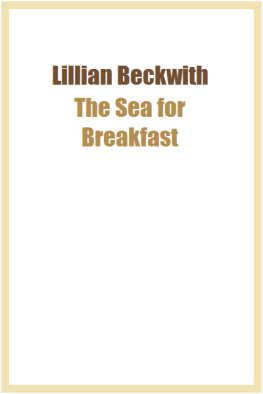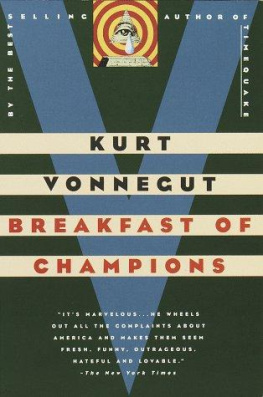Beckwith Lillian - The sea for breakfast
Here you can read online Beckwith Lillian - The sea for breakfast full text of the book (entire story) in english for free. Download pdf and epub, get meaning, cover and reviews about this ebook. City: Bath, England, year: 1996, publisher: For the Benefit of Mr. Kite;Chivers Audio Books, genre: Detective and thriller. Description of the work, (preface) as well as reviews are available. Best literature library LitArk.com created for fans of good reading and offers a wide selection of genres:
Romance novel
Science fiction
Adventure
Detective
Science
History
Home and family
Prose
Art
Politics
Computer
Non-fiction
Religion
Business
Children
Humor
Choose a favorite category and find really read worthwhile books. Enjoy immersion in the world of imagination, feel the emotions of the characters or learn something new for yourself, make an fascinating discovery.
- Book:The sea for breakfast
- Author:
- Publisher:For the Benefit of Mr. Kite;Chivers Audio Books
- Genre:
- Year:1996
- City:Bath, England
- Rating:5 / 5
- Favourites:Add to favourites
- Your mark:
- 100
- 1
- 2
- 3
- 4
- 5
The sea for breakfast: summary, description and annotation
We offer to read an annotation, description, summary or preface (depends on what the author of the book "The sea for breakfast" wrote himself). If you haven't found the necessary information about the book — write in the comments, we will try to find it.
The sea for breakfast — read online for free the complete book (whole text) full work
Below is the text of the book, divided by pages. System saving the place of the last page read, allows you to conveniently read the book "The sea for breakfast" online for free, without having to search again every time where you left off. Put a bookmark, and you can go to the page where you finished reading at any time.
Font size:
Interval:
Bookmark:

Lillian Beckwith
United Kingdom, 1916-2004
The Sea for Breakfast
1961, EN, 69301 words
The Sea for Breakfast finds Miss Peckwitt (as the islanders endearingly pronounce her name) settling into a home of her own on Bruach, and mastering with the help, and frequently the hindrance, of her fellow islanders such varied arts as peat-cutting, winkle-picking, and beachcombing. Originally published in 1961.
A Place of My Own
O ne hundred and ten; one hundred and eleven, ouch! One hundred and twelve, damn! For the third torrid day in succession I was exasperatedly discovering and extracting nails of every tortured shape and unexpected size from the wooden walls of my cottage kitchen. My tool, which I had previously understood to be a claw-headed hammer, had been bestowed upon me by Ruari, the imperiously obliging brother of my former landlady. He however had referred to it more colourfully as a cloven-footed hammer. It was a typically Hebridean tool with a thick, rough handle and a rusty head so loose on the shaft that it was a toss-up each time whether the nail would be prised out of the wall, or whether the cloven-foot would remain poised vacillatingly on the firmly embedded nail while I reeled back, brandishing the handle and recovering myself just in time to receive a blow of acknowledgement from the descending head. For the umpteenth time I stopped to massage tingling elbows with grazed fingers and swore as I jammed the head savagely back on to the shaft. For the umpteenth time I wished, rather half-heartedly, that the little village of Bruach were not set amidst such glorious isolation and, most whole-heartedly, that the terrain were less abundantly provided with handy-sized stones. As it was, even this poor makeshift had necessitated some diligent seeking. Still, I comforted myself as I doggedly counted my successes (simply so as to prove just how many nails one may expect to find in an old croft kitchen), the unpredictability of proceedings did serve to enliven a task that otherwise might have been as soporific as counting sheep.
Just why any household should have wanted or needed more than a hundred nails disfiguring their kitchen I could not understand. The six-inch ones higher up on the walls and the ones in the rafters would of course have been used for hanging fishing nets. In addition to those serving as picture hooks and those used for hanging coats and oilskins, some of the rest would doubtless have been used for strings of salt fish or rabbit skins. A few dozen nails, even fifty, I would have been prepared to accept as a normal complement, but over a hundred!
My kitchen walls, I lamented to Morag after my first impact with them, have more nails to the square foot than a fakirs bed.
Aye, but those is Hamishs mens nails, she replied reverently, and seeing that I looked blank, continued: Ach well, mo ghaoil, dyou see, Hamish and Mary that lived there had seven sons and all of them men yunderstand? Not like the wee ticks of things we have nowadays, but big men they was and strong, and every time one of them came back from the hill or from the sea theyd likely have a rabbit or a few fish and maybe a skart and theyd be after pickin up a stone just and bangin a nail into the wall so as to hang it away from the cats and the dogs.
It still puzzles me why there should have been such a glut of nails all ready to hand, here in Bruach of all places, I said.
But isnt the wood you gather from the shore full of them just, lassie? Have you no seen that for yourself? And Hamishs men wouldnt be the find to be wastin them.
Thus was the plethora of nails explained. Now I should like to explain why I, during three picnic-perfect days of early June when cuckoos were yodelling across the sun-soaked moors and bluebells were pealing wildly into bloom, should be gloomily and resentfully pulling all Hamishs mens nails out again.
When her nephew in Glasgow had been involved in an accident which was supposed to have affected his health generally, Morag, the crofter landlady from whom I had rented half a house since my arrival in Bruach three years previously, had decided that he and his wife, who was herself a semi-invalid, should come to live with her on the croft where she could keep a strict eye on the two of them. She also, she said, intended to keep a strict eye on their precocious little daughter, a design which I suspected privately, having met the child, would result in her having one more subject for her tyranny, for Morag, like all Gaels, loved to have a child about the house to indulge. Naturally the new arrangement meant that Morag and I, to our mutual regret, must part company, and I was faced with the alternative of returning South or looking for other accommodation locally. After three years of crofting life and with ill health only a memory, I found I did not relish the idea of returning to the noisy clutter of life in England where nowadays it seems there is too much prosperity for real happiness; too much hurry for humour. In Bruach there was prosperity enough for most things and time mattered little. My days were pleasant and full and the nights brought unbroken sleep so that even dreams had the continuity of one long novel in contrast to the disjointedness of a book of short stories. And undoubtedly I had grown fond of Bruach and its inhabitants, for the Gaels of the Hebrides are indeed a happy race. Even their language is happy; listening to the Gaelic is like listening to a series of chuckles; there is always a lilt even in harangue; often a smile in a scold. I might be shocked at some of the events of the day, but at night I could chuckle myself to sleep over them. I wanted to stay in Bruach, so I looked for a place of my own.
There were two empty cottages not far from the village. Tigh-na-Craig (House on the Rock), to the north, was situated close to the burial ground, the other, with an unpronounceable name the nearest I could get to it was Tigh-na-Mushroomac to the south, adjoined the cleg-infested moor. Faced with a choice between clegs and corpses I chose the clegs and was immensely relieved I had done so when I later heard Erchy, the poacher, telling someone: Ach, the grave will no take long to dig. Its no a County Council burial ground so youll not have to go more than two feet. Its no trouble at all. The County apparently insisted on four feet.
The cottage of Tigh-na-Mushroomac had been empty when I had first arrived in Bruach but the fact that it might be for sale did not emerge until after I had announced my intention of settling. The Bruachites are averse to putting their property on the open market but like to be wooed into graciously permitting you to buy provided you can convince them of your need and of your bank balance. Calum, one of Hamishs surviving sons and the owner of the cottage, lived in Glasgow, so I lost no time in contacting him and in visiting the local policeman in whose charge the key had been left.
My first meeting with the policeman, soon after my arrival in Bruach, had left a distinctly droll impression on both our minds. I had been on my way back to Morags one drearily wet evening when I had come upon his car parked plumb in the centre of the road, without lights of any sort. A little farther along the road a lorry too was stopped and beside it the policeman, watched attentively by the lorry driver, was siphoning petrol out of the tank of the lorry into a can. When he had transferred the petrol to the tank of his own car, the policeman generously offered me a lift home. Morag had been away in Glasgow at the time and as the policeman had yet to finish the enquiries about poaching he was engaged on making in the village, I invited him in for a meal. Earlier in the day Erchy had handed me a parcel of fish which he had said offhandedly were mackerel. I cooked one for the policeman. Before the meal he had seemed much dispirited by the results of his days work, but after the fish and several cups of tea his geniality was restored. Indeed he became quite jovial. He complimented me on my cooking and when he got up to go he impressed upon me that I must be very sure to thank Erchy for him and tell him that he, the policeman, had never tasted mackerel like them. I assured him I would do so.
Font size:
Interval:
Bookmark:
Similar books «The sea for breakfast»
Look at similar books to The sea for breakfast. We have selected literature similar in name and meaning in the hope of providing readers with more options to find new, interesting, not yet read works.
Discussion, reviews of the book The sea for breakfast and just readers' own opinions. Leave your comments, write what you think about the work, its meaning or the main characters. Specify what exactly you liked and what you didn't like, and why you think so.







![Franks - Breakfast greats: [delicious breakfast recipes, the top 90 breakfast recipes]](/uploads/posts/book/201211/thumbs/franks-breakfast-greats-delicious-breakfast.jpg)


